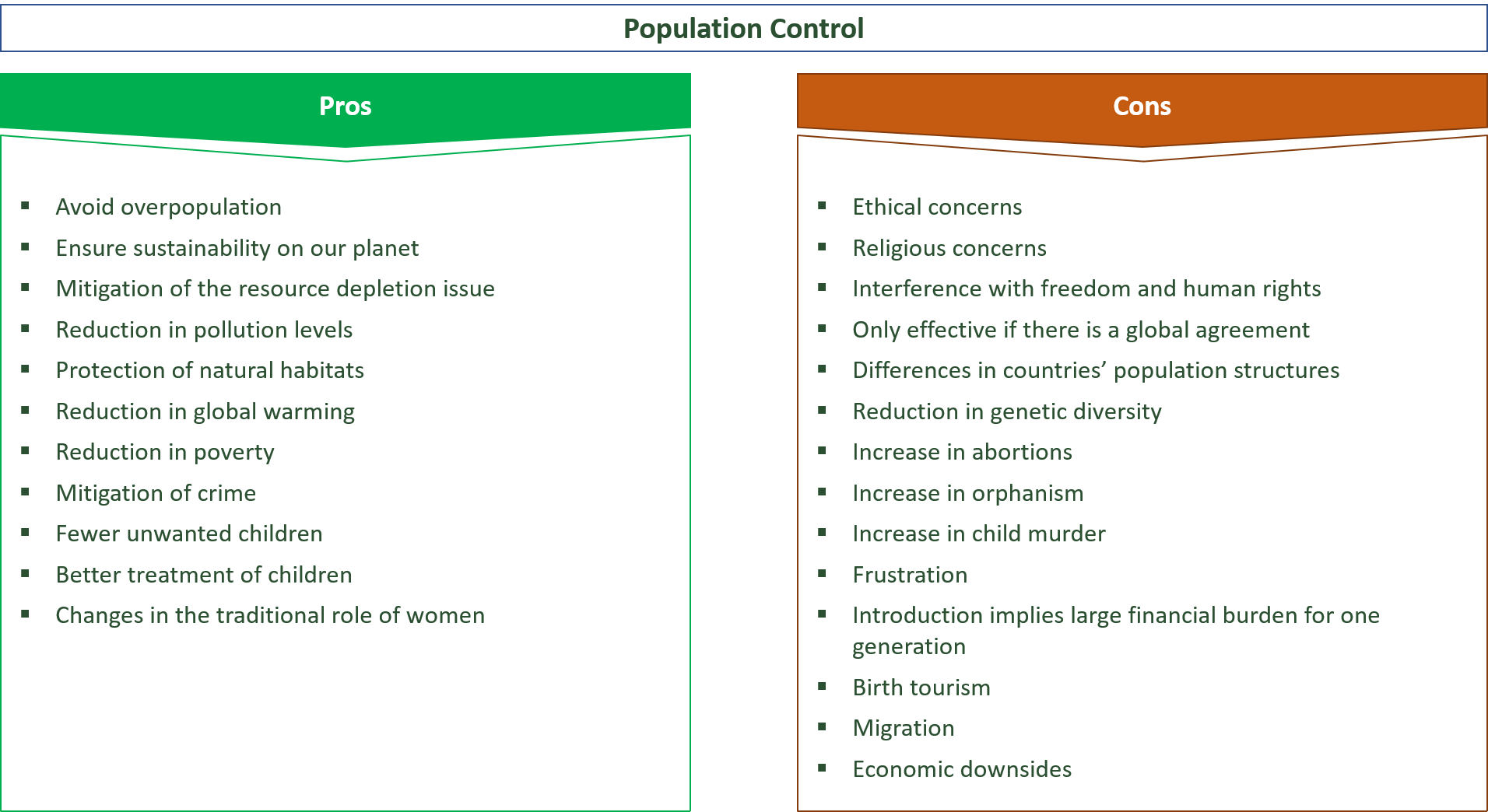“By improving health, empowering women, population growth comes down.”
Bill Gates, Businessman
Human Population Control: Pros, Cons & Alternatives

Human population control (often also referred to as human population planning) can be defined as the intention to control the growth rate of the human population.
Even though in the past centuries, human population planning had been introduced with the goal to increase the world population, in the nowadays context, it is rather meant to limit the number of people on our planet in order to fight the adverse consequences of overpopulation.
As of 2020, 7.8 billion people are populating our planet. According to estimates of the Department of Economic and Social Affairs of the United Nations, until the year 2100, the world population will exceed 10 billion people.
Therefore, it seems quite reasonable to consider population control measures to reduce population growth in order to ensure long-term sustainability.
Population planning can have significant upsides for our environment, but may also imply serious downsides.
In this article, the pros and cons of population planning are examined.
Audio Lesson
Contents
Advantages of Population Control
- Avoid overpopulation
- Ensure sustainability on our planet
- Mitigation of the resource depletion issue
- Reduction in pollution levels
- Protection of natural habitats
- Reduction in global warming
- Reduction in poverty
- Mitigation of illegal actions
- Fewer unwanted children
- Better treatment of children
- Changes in the traditional role of women
Avoid overpopulation
One significant upside of population control is that it can effectively avoid or at least reduce the overpopulation problem.
As we all know, our planet only offers limited capacities regarding resources and many other things.
Therefore, if these capacities are exceeded due to population growth, we as humanity would face serious problems.
Thus, population control may be crucial in order to limit the number of people on our planet to an environmentally-healthy level.
Ensure sustainability on our planet
In order to make human interventions with nature sustainable in the long run, it may be necessary to reduce the number of people on our planet or at least to reduce the growth rate of our global population.
An increase in population also always implies the need for more space for housing, which in turn implies the infiltration and destruction of natural habitats of animals and plants.
Hence, in order to limit these issues, population control may be a suitable measure.
Mitigation of the resource depletion issue
Our natural resources, especially our fuel energy sources, may become depleted in the near future.
The higher the number of people populating our planet, the faster our resources will be depleted since the overall consumption volume increases with an increasing number of people.
Therefore, in order to fight the resource depletion issue, it would be reasonable to take action against the explosion in population numbers.
Reduction in pollution levels
More people on our planet also imply higher pollution levels and also more waste production.
In turn, this leads to several environmental issues.
In order to fight those environmental problems, we should also consider limiting the number of people on our planet.
By doing so, our overall waste production as well as our pollution levels would be lowered in a natural manner.
Protection of natural habitats
With a growing number of people populating our planet, many natural habitats will become endangered or even destroyed.
A higher number of people also implies the need for more space for housing, farming and additional infrastructure purposes.
To supply all of these things, large areas of land have to be used, which may imply the destruction of nature reserves and may also contribute to the deforestation issue.
Reduction in global warming
Everyone of us contributes to greenhouse gas emissions through our consumption behavior and also through the use of our cars and other devices.
However, these greenhouse gas emissions contribute to global warming.
An increasing number of people on our planet also implies an acceleration of global warming since a higher total amount of greenhouse gases will be emitted into our atmosphere.
Thus, effective population control mechanisms could mitigate the global warming issue to a certain extent.
Reduction in poverty
There is a certain limited amount of resources on our planet.
This means that there exists a maximum of resources everyone of us can use on average.
However, this also implies that with an increasing number of people on our planet, the average amounts of resources available per capita will be lowered.
This may in turn lead to poverty for a high number of people.
Therefore, it may be reasonable to limit the number of people on our planet in order to increase the available resources per capita and thus to decrease the extent of poverty.
Of course, since poverty is not only caused by a limited amount of resources but also by the global distribution of wealth, governments all over the world have to ensure that our resources are distributed in a sufficiently fair manner.
Mitigation of illegal actions
Since the number of illegal activities is positively correlated with poverty levels, a decrease in poverty due to population control may also lower the crime problem.
Due to the decrease in poverty, people may now be able to provide for their families in a legal way and may not have to get involved in criminal activities anymore.
Fewer unwanted children
With proper population control, chances for unwanted children may decrease since people will be more careful and use more contraceptives since they know they are only allowed to have a limited number of children and will carefully think about when it is the right time to get them.
Better treatment of children
Moreover, if women are only allowed to have a quite limited number of children, chances are that they value their children even more and treat them better compared to a state where women are able to have as many children as possible.
Additionally, with fewer children, parents may be able to treat their children better and to give them more attention, which may lead to a healthier development for these children.
Changes in the traditional role of women
In many countries worldwide, the role model of a woman is still quite traditional, which means that women are still considered to be responsible for child-rearing instead of pursuing a career like men.
However, by introducing a limit for children, women would have much more time to engage in career opportunities and the role model of women would likely change in a modern direction.

Downsides of Population Control
- Ethical concerns
- Religious concerns
- Interference with freedom and human rights
- Only effective if there is a global agreement
- Differences in countries’ population structures
- Reduction in genetic diversity
- Increase in abortions
- Increase in orphanism
- Frustration
- Introduction implies large financial burden for one generation
- Birth tourism
- Migration
- Economic downsides
Ethical concerns
In the discussion regarding population control, many people have ethical concerns against limitations concerning the number of children of a family.
They argue that no human being has the right to decide about the number of children of other families since humans are not gods and have no higher power to know what’s wrong and what’s right.
Therefore, a limit for children would not be in line with a tolerant society and may also violate human ethical values.
Religious concerns
Moreover, in some religious world views, a high number of people in a traditional family are the north star for a fulfilled life.
Thus, limiting the number of children for those people would violate their freedom of religion.
Interference with freedom and human rights
Limitations of all sorts are usually confinements of human freedom.
Therefore, limitations and regulations should only be applied in case a higher global social optimum can be reached compared to a state without limitations.
Since it is questionable if this interference with human freedom can be justified in the context of birth control, there might be arguments that this interference does not provide enough social value and should therefore be avoided.
Only effective if there is a global agreement
Population control will only be effective if most of the countries worldwide will join such an agreement.
However, since there are huge differences regarding value systems, technological development and ideologies around our globe, it will be quite hard to convince many countries to join such an agreement.
Instead, many countries are likely to refrain from such an agreement since they see more downsides than upsides of such an agreement for their country in the current stage of the country’s development.
Differences in countries’ population structures
Global population control may also not be a suitable measure since there is a big difference in the age distribution across countries.
While it would make sense for some countries to introduce population control mechanisms, it will not even be possible for others since their social security system would likely collapse due to the introduction of those measures.
Reduction in genetic diversity
The higher the number of people populating our planet, the higher the genetic diversity and the higher the chances for human survival in case of a severe pandemic.
In turn, a reduction in population numbers would imply a higher chance for human extinction since the genetic diversity would likely be lowered.
Increase in abortions
With population control, the number of abortions is likely to increase.
This has been observed in China once the one-child policy had been introduced.
This is quite logical since if a family already has a child and the mother has an unwanted pregnancy, families in this situation will often decide to go for abortion since they fear sentences for violating the one-child policy.
Increase in orphanism
Population control measures also make it more likely that children become orphans.
Families that have more than the allowed number of children may give away their children since they fear the consequences once the government gets notice of the policy violation.
Frustration
Some families have the urgent wish to have a big family with many children.
For those people, population control mechanisms like a one-child policy may be quite frustrating since they may not be able to achieve their dream of a big family with many children.
In turn, frustration often leads to several other issues, including mental problems and an increase in crime rates.
Introduction implies large financial burden for one generation
In many countries, an introduction of population controls may not be achievable at all since their social structure and their social security system may not allow it.
For instance, many countries have a social security system where young people pay for the old.
However, this implies that if the number of young people is drastically decreased due to one-child policies, every young person has to provide for multiple old persons, which may lead to a financial collapse of the whole social security system of a country.
Birth tourism
Birth tourism is a well-known phenomenon in countries with strict population control measures.
It basically means that families travel to other countries right before their baby is born in order to supply this baby with a different nationality so that they are not officially violating their national birth control laws.
This behavior has been often observed during the one-child policy in China where many Chinese people traveled to the United States right before giving birth in order to get U.S. citizenship for their baby.
Migration
Couples who urgently want to have a big family may decide to migrate from countries with strict population control policies to countries with lax population control policies in order to be able to achieve their dream of a big family.
This may lead to several other issues related to migration.
Economic downsides
There may also serious economic disadvantages from population control regulations for a country.
Especially if the country’s age and resource structure would be supporting a higher number of children, introducing population control measures like one-child policies could seriously hurt the economic progress of those countries.

Alternatives to Conventional Population Control Measures
- Improve education levels
- Strengthen women rights
- Adjustments in our consumption behavior
- Reduction in waste production
- Better social security and health insurance
- Transition to a sustainable global human behavior
- Elimination of tax advantages for children
Improve education levels
Instead of introducing strict population control measures like one-child policies, governments around the world could go for a different approach.
This could mean improving the overall education levels since a higher education level usually leads to a lower number of children.
Thus, by improving the education levels, population growth could be reduced in a natural manner.
Strengthen women rights
Since in many countries, women are still considered to be responsible to take care of children and often do not have equal rights compared to men, in those countries, big families are much more common since it is considered to be socially correct to have many children and women are often even forced by men to give birth multiple times.
By strengthening women’s rights, women may be free to pursue a career instead of solely taking care of their children.
By giving women this option, chances are that the number of children will decrease on average since women may want both children but also a career and they may limit the number of children due to that.
Adjustments in our consumption behavior
Since population control is often meant ensuring sustainability regarding our resources, instead of introducing population control measures, people all over the world should adjust their consumption behavior in an eco-friendly manner.
By reducing overall consumption, we may be able to avoid resource depletion even without introducing binding population control policies.
Reduction in waste production
As a global society, we should also try to reduce our waste production.
This means that we should use our material things more efficiently.
For instance, you should try to give away old but still working things to your family and friends who may be happy to reuse those things.
If no one wants to use your old stuff anymore, at least make sure to separate your waste to make it suitable for recycling purposes in order to ensure the efficient use of our natural resources.
Better social security and health insurance
Since in poor countries with a lack of social security and health insurance, children are often considered to be some kind of insurance for the elderly members of a family, especially in those regions, big families are quite common.
By introducing better social security and health insurance schemes, the social security levels of people would increase and the incentive to have many children would decrease, which would reduce the overall number of people on our planet in a fully natural way.
Transition to a sustainable global human behavior
In order to make our behavior sustainable without having to introduce binding population control measures, it is crucial that we change our value systems to a state where fighting resource depletion and pollution should be higher prioritized than the consumption of material goods.
If we get to this state, we would be able to sustain a big global population since the use of resources per capita would decrease significantly with this mindset.
Elimination of tax advantages for children
In order to reduce the incentive for big families with many children, countries which offer tax advantages for having many children should reduce their tax advantages for children.
Therefore, some people may be less eager to have many children since the financial government support would be lowered.
Conclusion
There are several pros as well as cons regarding the topic of population control.
Especially due to the heterogeneity regarding technological development and age structure, it is hard to introduce effective global measures of population control.
It seems that instead of introducing such global measures, it would be more effective to go for the alternative approaches mentioned before.
By doing so, we could decrease population growth in a fully natural manner without the need for forcing population control mechanisms.
Sources
https://en.wikipedia.org/wiki/Human_population_planning
https://www.britannica.com/science/population-explosion
https://www.who.int/bulletin/volumes/90/2/12-040212/en/
https://population.un.org/wpp/

About the author
My name is Andreas and my mission is to educate people of all ages about our environmental problems and how everyone can make a contribution to mitigate these issues.
As I went to university and got my Master’s degree in Economics, I did plenty of research in the field of Development Economics.
After finishing university, I traveled around the world. From this time on, I wanted to make a contribution to ensure a livable future for the next generations in every part of our beautiful planet.
Wanna make a contribution to save our environment? Share it!
